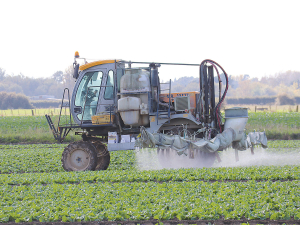Greenpeace fearmongering on glyphosate - Feds
Federated Farmers says climate protest group Greenpeace is manufacturing outrage and attempting to scare New Zealanders with headlines that have no basis in science.
 Many studies - carried out in New Zealand and overseas - have come to the conclusion that glyphosate is perfectly safe.
Many studies - carried out in New Zealand and overseas - have come to the conclusion that glyphosate is perfectly safe.
There's growing talk around New Zealand and the world about glyphosate being a health hazard, possibly a carcinogenic.
Glyphosate is a broad spectrum herbicide that serves as the main ingredient in weed killers like Round-Up and others. It is the most widely used herbicide in the world.
Numerous district councils in New Zealand and foreign countries are attempting to phase out glyphosate, while some are even banning it out right. This has many farmers and others worried.
A NZIER report shows that herbicides are worth between $2.7 to $8.6 billion to New Zealand agriculture, with an average impact on output of up to 20%.
In a recent press release, Agcarm states that glyphosate's broadspectrum effectiveness can eliminate nearly all weeds, which many other herbicides cannot.
"Without it, producers would face substantial weed pressure - as weeds compete with crops for light, water and nutrients," it claimed. "Even greater pressure exists with climate change and the need for farming practices to become more sustainable."
Additionally, Agcarm state that farmers can reduce their environmental footprint by minimising tillage - benefiting soil health, lessening carbon emissions, conserving water and reducing labour and fuel costs. Glyphosate can be applied with fertiliser, seeds and cover crops in one go - saving time and money.
A large amount of the product is used by local councils and government bodies to manage weeds in public spaces, including railways and roadways to improve visibility and enhance safety.
Glyphosate works by inhibiting the enzyme ESPS synthase, which is found in plants. Notably, the humans and animals do not contain this enzyme, which explains its previous reputation for safety. In addition, many modern crops have been genetically modified to be resilient to glyphosate - meaning that, for all intents and purposes, glyphosate should only be able to harm weeds.
As an extra note the Environmental Protection Agency in the US has found that even when directly ingested in a suicide attempt, doses of 150ml (almost triple the maximum recommended dosage for the hardiest weeds) or less have not led to death.
It pointed out that of all suicide attempts linked to drinking glyphosate herbicides, mortality rates were only 17% - far lower than bleach, drain cleaner or other commercially available cleaning products or pesticides.
Many studies have been carried out in New Zealand and overseas. Most of them have come to the conclusion that glyphosate is perfectly safe or, at worst, no more dangerous than any other similar product when used according to instructions.
But there are exceptions. The International Association for Research of Cancer claims glyphosate is dangerous. However, further analysis reveals that compared to the World Health Organization study that claimed otherwise, the IARC had eight evaluated studies cited compared to the WHO's 15 studies.
Both organisations have had accusations of bias and selectively editing results to favour one outcome.
Many conflicting opinions are present regarding glyphosate, even within the same spheres of influence.
Agcarm, the body that represents NZ's chemical manufacturers and distributors, claims that many possible substitutes for glyphosate are either more toxic or less effective. Therefore, it believes that it's highly important - before making any decisions regarding bans or free application - that all the facts and differing viewpoints are considered.
A New Zealand dairy industry leader believes the free trade deal announced with India delivers wins for the sector.
The Coalition Government will need the support of at least one opposition party to ratify the free trade deal with India.
Primary sector leaders have welcomed the announcement of a Free Trade Agreement between India and New Zealand.
At Pāmu’s Kepler Farm in Manapouri, mating has wrapped up at the across-breed Beef Progeny Test.
More than 150 people turned up at Parliament recently to celebrate the 20th anniversary of Horticulture New Zealand (HortNZ).
Biosecurity New Zealand says Kiwis should continue to keep an eye out for yellow-legged hornets (Vespa velutina) over the holiday season.